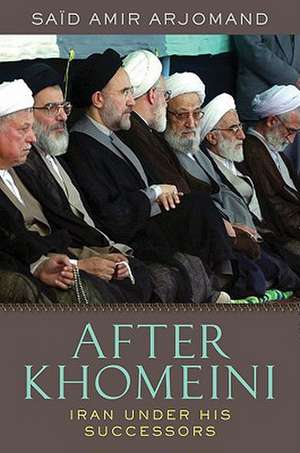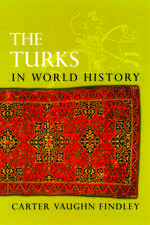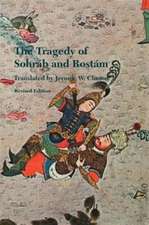After Khomeini: Iran Under His Successors
Autor Saïd Amir Arjomanden Limba Engleză Hardback – 27 ian 2010
In After Khomeini, Said Amir Arjomand paints a subtle and perceptive portrait of contemporary Iran. This work, a sequel to Arjomand's acclaimed The Turban for the Crown, examines Iran under the successors of Ayatollah Khomeini up to the present day. He begins, as the Islamic Republic did, with Khomeini, offering a brilliant capsule biography of the man who masterminded the revolution that overthrew the Shah. Arjomand draws clear distinctions between the moderates of the initial phrase of the revolution, radicals, pragmatists, and hardliners, the latter best exemplified by Mahmud Ahmadinejad. Taking a chronological and thematic approach, he traces the emergence and consolidation of the present system of collective rule by clerical councils and the peaceful transition to dual leadership by the ayatollah as the supreme guide and the subordinate president of the Islamic Republic of Iran. He explains the internal political quarrels among Khomeini's heirs as a struggle over his revolutionary legacy. And he outlines how the ruling clerical elite and the nation's security forces are interdependent politically and economically, speculating on the potential future role of the Revolutionary Guards. Bringing the work up to current political events, Arjomand analyzes Iran's foreign policy as well, including the impact of the fall of Communism on Iran and Ahmadinejad's nuclear policy.
Few countries loom larger in American foreign relations than Iran. In this rich and insightful account, an expert on Iranian society and politics untangles the complexities of a nation still riding the turbulent wake of one of history's great revolutions.
"
Preț: 106.84 lei
Preț vechi: 125.96 lei
-15% Nou
Puncte Express: 160
Preț estimativ în valută:
20.45€ • 22.20$ • 17.17£
20.45€ • 22.20$ • 17.17£
Tipărit la comandă
Livrare economică 24-30 aprilie
Preluare comenzi: 021 569.72.76
Specificații
ISBN-13: 9780195391794
ISBN-10: 0195391799
Pagini: 268
Dimensiuni: 163 x 243 x 21 mm
Greutate: 0.52 kg
Editura: Oxford University Press
Colecția OUP USA
Locul publicării:New York, United States
ISBN-10: 0195391799
Pagini: 268
Dimensiuni: 163 x 243 x 21 mm
Greutate: 0.52 kg
Editura: Oxford University Press
Colecția OUP USA
Locul publicării:New York, United States
Descriere
Iran has not ceased to surprise the world since the American ambassador's famous "thinking the unthinkable" 1978 cable about the imminent fall of the Shah and the coming of Islamic revolution. The apparent sequence of moderate government of President Hashemi-Rafsanjani (1989-97) and democratic reform under President Khatami (1997-2005) was followed by the return of the hardliners and revolutionary populism coupled with an aggressive foreign policy, including anuclear program. Iran's political regime has proved remarkably resilient through all these changes, despite the disaffection of the younger half of the population, and become all the stronger, partly as a result of the Bush administration's ill-advised bluff about regime change. The death of Imam Khomeini as its charismatic leader in 1989 did not mean the end of the Islamic revolution, but only the beginning of a prolonged struggle among the children of the revolution over Khomeini's heritage. The integrative social revolution begun in 1979 has continued quietly, while the raucous/noisy struggle to define, structure and control the new Islamic political order set up by Khomeini among different factions of his followers has produced a unique political regime whichdefies understanding. Arjomand draws on the sociology of revolution to offer a general explanation of political developments in Iran in the last two decades while seeking to understand its unique features in terms of constitutional politics of the creation of the post-revolutionary order. Not only Iran'sdomestic politics but also its foreign policy are shown to follow a pattern typical of the great revolutions. Surprising as it may seem, the parameters for Iran's constitutional politics in the last two decades are those set by Khomeini's mixture of theocratic, republican and populist elements in the ideology of the Islamic revolution.
Notă biografică
Saïd Amir Arjomand was born in Tehran and is the founder and president (1996-2002, 2006-2009) of the Association for the Study of Persianate Societies and the Editor of the Journal of Persianate Studies.














